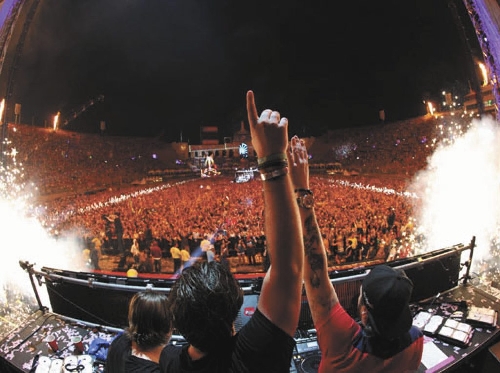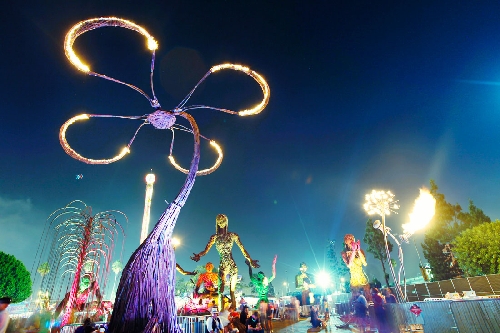Electric Daisy Carnival invading Las Vegas after recent problems
It's easy for Richard Brian to tell who's on "it."
The Las Vegas resident has been at enough raves -- dances dominated by electronic music and pulsating lights -- to know. He doesn't even use the drug's name. "It" suffices.
That's because raves are synonymous with the tiny pill Ecstasy, a man-made stimulant and hallucinogenic that allows ravers to dance for hours. Ravers even suck on baby pacifiers to avoid teeth grinding because of the energy overload, Brian said.
"I'm not saying everybody's on it, but definitely a lot of them are," said the 29-year-old photographer, describing the crowd of 185,000 crammed into Los Angeles Memorial Coliseum last year for the country's largest rave, Electric Daisy Carnival. "It's just a part of it."
Many perceived it as a harmless part, until last year.
A 15-year-old girl died of an Ecstasy overdose at the Coliseum, a first in the Los Angeles event's 14 years.
Event promoter Insomniac is now bringing the carnival to Las Vegas and taking a "zero tolerance" stance on drug use. The event will arrive Friday for three days of sundown-to-sunup dancing at the Las Vegas Motor Speedway. About 80,000 ravers -- most in their 20s -- are expected to fill the field and stadium each night.
But can the drug defining the dance culture be pulled from it, or are the two too tightly tied?
The main event of the traveling rave has always been in Los Angeles, bringing carnival rides, multiple stages, DJs, artists and elaborate light shows. But, under pressure, it was forced to leave L.A. because of the girl's death and about 230 people who needed emergency medical treatment last year.
"You'd see a person being wheeled out on a stretcher every 20 minutes or so," Brian said.
It was a scene repeated Saturday in Dallas where one teenager died and more than two dozen other Electric Daisy Carnival participants were taken to hospitals for drug, alcohol and heat-related issues, according to The Associated Press.
For those reasons, promoters and Las Vegas police know the world's watching this weekend. And they're taking pains to prevent history from repeating itself.
"It's not going to be tolerated," police spokesman Marcus Martin said. "There's definitely been a lot of planning going into this."
NO LONGER A BLIND EYE
To avoid problems, Insomniac has raised the minimum age of attendees from 16 years old to 18. Security will check IDs using scanners and search everyone upon entry. On top of private security, about 160 Las Vegas police officers will monitor outside and inside the venue for drug use. And undercover narcotics officers will be among the crowd, Martin said.
It will be an uphill battle nonetheless, he admitted. Security can't spot and stop every pill in pat-downs. Ecstasy is the size of a baby aspirin and not difficult to hide.
Ravers can just pop one before entering or slip one into their mouths during the event. Where 160 officers may seem like a lot, that's only one officer per 500 people.
But police aren't there to prevent the crowd from turning riotous, like a drunken mob.
Ecstasy users are usually "placid," said Martin, who has worked two raves.
The drug triggers a wave of serotonin, commonly called the "happiness hormone," causing an elation and heightened sensitivity.
"Everyone is touchy-feely, rubbing up on each other," said Alexa Kelly, a 20-year-old Las Vegas resident who's been to raves but is attending the Electric Daisy Carnival for the first time.
Brian said the drug makes all senses more excitable.
"People rub Vick's VapoRub inside a doctor's mask or wave glow sticks in front of their faces while dancing to stimulate themselves," he said.
IDEAL CONDITIONIS FOR EMERGENCIES
The main issue is "medical," Martin said.
Ecstasy users experience dehydration and overheating because the drug increases heart rate and blood pressure, which can cause stroke, kidney failure or seizures. On top of that, people take Ecstasy in the worst environment. At raves, dancers are crammed together in hot environments, raising their body temperatures even more.
Michelle Gargano was at the Coliseum last year and said the field was so packed that security had to wait for a person to leave before allowing one to enter. That was, until the crowd broke the fence down.
"It's just madness," the 20-year-old Las Vegas resident said. "I don't know how anyone stands in there."
Brian said, "People were packed so tightly around each other, they began peeing themselves. They can't get out."
Martin said that won't be a problem this weekend. The speedway's five times larger. Plus, five air-conditioned cooling tents, 96 water-bottle filling spouts and a 140-by-300-foot misting tent will be scattered throughout the grounds to fight the heat.
Despite critics' concerns, Las Vegas Mayor Oscar Goodman said the carnival's Los Angeles problems won't follow it here.
"I don't care what L.A. says. We're the entertainment capital of the world," said Goodman, who's also chairman of the Las Vegas Convention and Visitors Bureau.
Las Vegas can handle what Los Angeles can't, he said. However, police and security can't stop the inevitable, he said.
"If people want to be idiots, you can't stop them ... or blame the promoter," he said.
Insomniac has signed a multiyear contract with the speedway, according to an event spokesperson.
'ZERO TOLERANCE' POLICY
Insomniac has held smaller Electric Daisy Carnivals leading up to the main Las Vegas event, testing their "zero tolerance" drug policy.
The first drew 22,000 people to Orlando's Tinker Field for a May weekend.
"It was really hot," said Orlando Police Sgt. Vincent Ogburn. "But no big issues. It was a well-run event."
Temperatures lingered in the 90s with thunderstorms, making it humid.
Only four arrests came out of it, one of which was for narcotics possession. A handful of hospital trips were needed but for nothing life-threatening, according to Heather Fagan, press secretary for Orlando's mayor.
Orlando's city leaders implemented strict rules after looking at the problems in Los Angeles, requiring the carnival to be shut down by midnight, Fagan said.
A curfew isn't an option in Las Vegas, said Insomniac owner Pasquale Rotella. Desert heat forces it to occur at night. Even then, the temperature will linger in the 80s most of the time, reaching a mid-70s low, according to the National Weather Service.
The carnival in Aurora, Colo., attracted 2,000 people on June 11 and also experienced a government-enforced curfew. Police admitted one person for detoxification, reported 11 incidents of drug possession and found a bag of 50 Ecstasy pills that someone had abandoned, according to Sheriff Grayson Robinson.
In Dallas last weekend , 19-year-old rave attendee Andrew Graf died after being taken to Baylor University Medical Center, according to The Associated Press. The cause of Graf's death is under investigation.
A 15-year-old girl died in Los Angeles last year after overdosing on Ecstasy while attending the Electric Daisy Carnival there.
The Sin City main event is expected to be seven times larger than the other three combined.
AN ISOLATED INCIDENT?
Los Angeles 2010 may not have been a fluke but may just be the beginning, according to the U.S. Centers for Disease Control and Prevention. The government agency investigated the Ecstasy-rave connection after learning of six emergency-room visits and one death after a New Year's Eve rave in Los Angeles. They discovered 18 patients visited ERs that night because of Ecstasy complications -- one of whom was admitted to intensive care for seizures, and kidney and liver failure, remaining in the hospital for 28 days. All were 16 to 34 years old.
The CDC suspected drug contamination may have been to blame but found that Ecstasy overdose was the culprit. While doing this investigation, the CDC was interrupted by a San Francisco rave that resulted in two Ecstasy-overdose deaths.
The CDC found that ER visits increased 75 percent from 2004 to 2008 for Ecstasy-caused complications, possibly attributable to young adults having a decreased perception of the drug's risk, as reported in a national survey.
The Electric Daisy Carnival death of the 15-year-old girl occurred two weeks after the CDC released its report.
Dangerous or not, Brian doesn't see last year's death as changing much about this year's carnival.
"It will never disassociate itself with raves," he said. "It's just a part of it. There's definitely going to be a lot of people on it next weekend."
Contact reporter Trevon Milliard at tmilliard@reviewjournal.com or 702-383-0279.
Electric Daisy Carnival
Electric Daisy Carnival
When: Friday, Saturday and Sunday from 8 p.m. to dawn
Where: Las Vegas Motor Speedway, 7000 N. Las Vegas Blvd.
Tickets: Single-day general admission is sold out; VIP tickets are $200; three-day passes are $215 for general admission and $500 for VIP
For more information, visit: electricdaisycarnival.com























